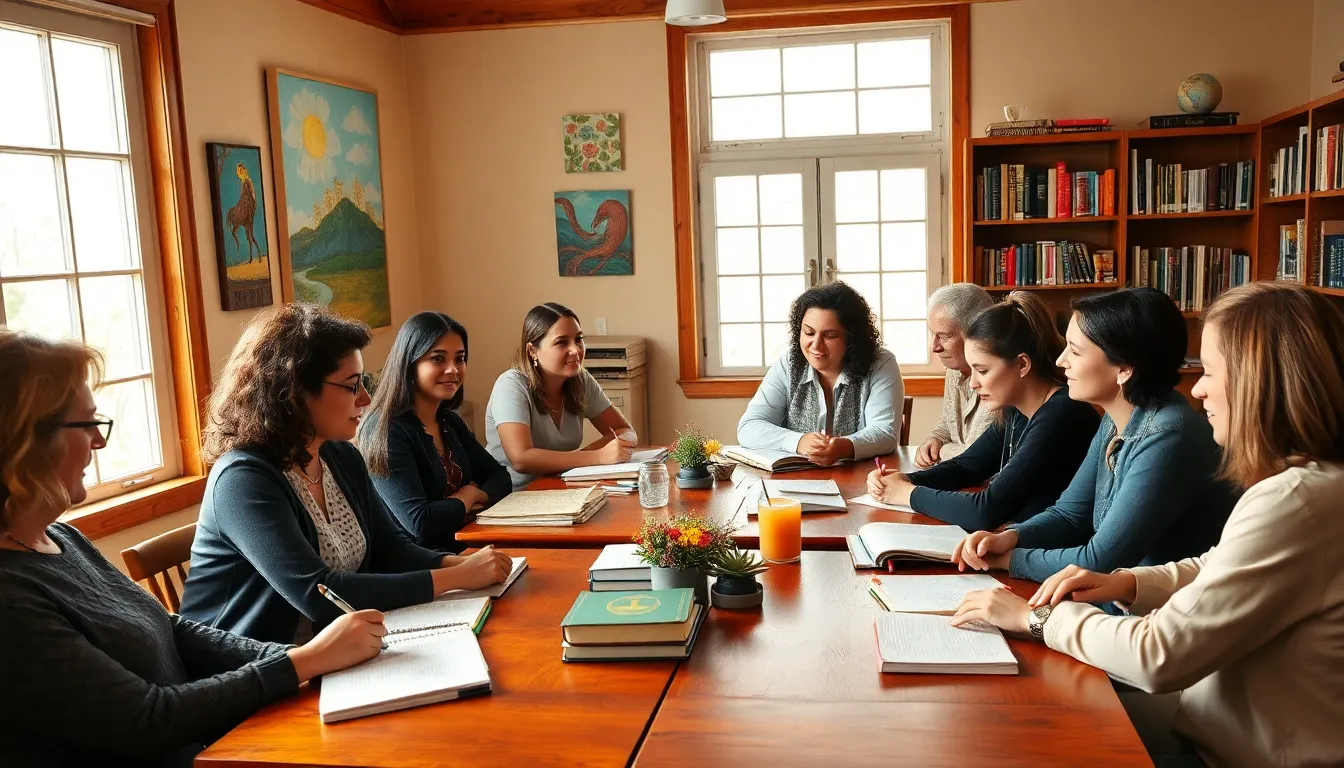In a world where emojis often replace heartfelt words, poetry classes stand as a beacon of creativity and expression. Imagine diving into a realm where metaphors dance and similes sing, all while sipping coffee that’s probably too strong for your own good. Whether you’re a seasoned sonneteer or someone who thinks a haiku is a fancy sushi roll, there’s a place for everyone in the poetic playground.
These classes don’t just teach you how to rhyme; they unlock the door to your inner bard. With laughter and a sprinkle of inspiration, participants discover the joy of crafting verses that resonate. So why not trade in those mundane evenings for a chance to unleash your creativity? Who knows? You might just pen the next great love poem—or at least a hilarious ode to your cat.
Poetry Class
Poetry classes provide a unique environment for writers to explore their creative voice. Students engage with various poetic forms, from sonnets to free verse, allowing for a diverse range of expression. These classes often include guided writing exercises, which help participants overcome writer’s block and spark inspiration.
Interaction among peers enhances the learning experience. Feedback sessions allow individuals to share their work and gain insights from others. This collaborative atmosphere fosters a sense of community and encouragement.
Instruction typically covers key poetic elements such as imagery, rhythm, and metaphor. Understanding these tools equips writers to create more impactful verses. Classes may also analyze the works of renowned poets, which offers context and a deeper appreciation for the craft.
Instructors often bring extensive experience to their teaching, guiding students through the nuances of poetry. Their expertise facilitates personalized learning, helping each participant grow at their own pace. Many classes cater to varying skill levels, from beginners to advanced poets.
Explore the potential for personal growth through poetry. Writing can serve as a therapeutic outlet, allowing individuals to express emotions and reflect on experiences. Whether crafting a heartfelt love poem or a humorous piece, each individual writes their unique story, one verse at a time.
Benefits Of Taking A Poetry Class

Poetry classes offer numerous advantages that enhance both creativity and writing ability. Participants experience a supportive environment where self-expression flourishes.
Creative Expression
Exploring poetry strengthens individual creativity. Students engage with diverse poetic forms, allowing personal styles to emerge. Writers gain confidence as they experiment with imagery and voice. Each class provides opportunities to share work, helping participants receive constructive feedback. This exchange fosters a sense of community and encourages risk-taking in writing. By articulating emotions through verse, students learn to express their thoughts in unique ways. Overall, participation in a poetry class deepens one’s appreciation for the art form while nurturing authentic voices.
Improved Writing Skills
Developing writing skills occurs naturally in poetry classes. Instructors guide students through essential poetic elements like meter, rhyme, and metaphor. Practicing these concepts enhances clarity and expression in their writing. Class activities often involve analyzing works from established poets, further instilling technical proficiency. Engaging with peer critiques sharpens editing skills as individuals assess and refine poetry. Over time, students notice a significant improvement in their writing not just in poetry but across various projects. This skill enhancement builds a solid foundation for future literary pursuits.
Structure Of A Typical Poetry Class
A typical poetry class consists of an engaging and structured format that promotes creativity and learning. Participants immerse themselves in various poetic forms and techniques, enhancing their writing skills.
Curriculum Highlights
The curriculum covers essential elements of poetry including imagery, rhythm, and metaphor. Students analyze classic and contemporary works, gaining insight into different styles. Engaging writing prompts encourage self-expression and experimentation. Workshops allow students to share their creations, fostering peer interaction. Critique sessions focus on constructive feedback, aiding in skill development. Participants also explore thematic elements, learning how to weave personal experiences into their poetry. Overall, the curriculum is designed to nurture unique voices while building confidence in writing.
Teaching Methods
Experienced instructors utilize diverse teaching methods to accommodate various learning styles. They often incorporate discussions, allowing participants to share thoughts on poetic techniques. Guided exercises help unlock creative potential and address writer’s block. Instructors may use multimedia resources to illustrate concepts and inspire ideas. Small group activities encourage collaboration, leading to richer discussions among peers. Personalized feedback from instructors ensures each student receives attention tailored to their needs. Emphasis on practice and exploration makes the class dynamic and enjoyable.
Types Of Poetry Classes Available
Poetry classes come in various formats, catering to different preferences and learning styles. Understanding these types helps individuals choose the best fit for their creative journey.
Online vs. In-Person
Online poetry classes offer flexibility and accessibility, allowing participants to join from anywhere with an internet connection. These classes often include pre-recorded lessons and live sessions, fostering a sense of community through virtual discussions. In-person classes create an intimate setting where students engage directly with instructors and peers. The face-to-face interaction enhances collaboration and immediate feedback, making discussions more dynamic. Each format presents unique advantages, so personal preference plays a significant role in the decision.
Workshops vs. Traditional Classes
Workshops emphasize hands-on experience, focusing on writing and sharing original poems among the group. They encourage spontaneous creativity and foster a supportive atmosphere for instant feedback. Traditional classes typically follow a structured curriculum, covering essential poetic techniques and elements through lectures and analyses. These classes build a solid foundation in poetry writing while offering space for experimentation. Both options provide valuable learning opportunities, appealing to those looking for structured guidance or those seeking immediate avenues for creative expression.
Conclusion
Poetry classes offer a unique opportunity for individuals to explore their creativity and develop their writing skills. Whether through structured lessons or spontaneous workshops participants can find joy in crafting their own verses. Engaging with peers and receiving constructive feedback fosters a supportive environment that nurtures growth and self-expression.
As students delve into various poetic forms they not only enhance their understanding of poetry but also discover their authentic voices. The benefits extend beyond writing as poetry serves as a powerful tool for emotional expression and personal reflection. Embracing the art of poetry can lead to meaningful connections and a deeper appreciation for the written word.

